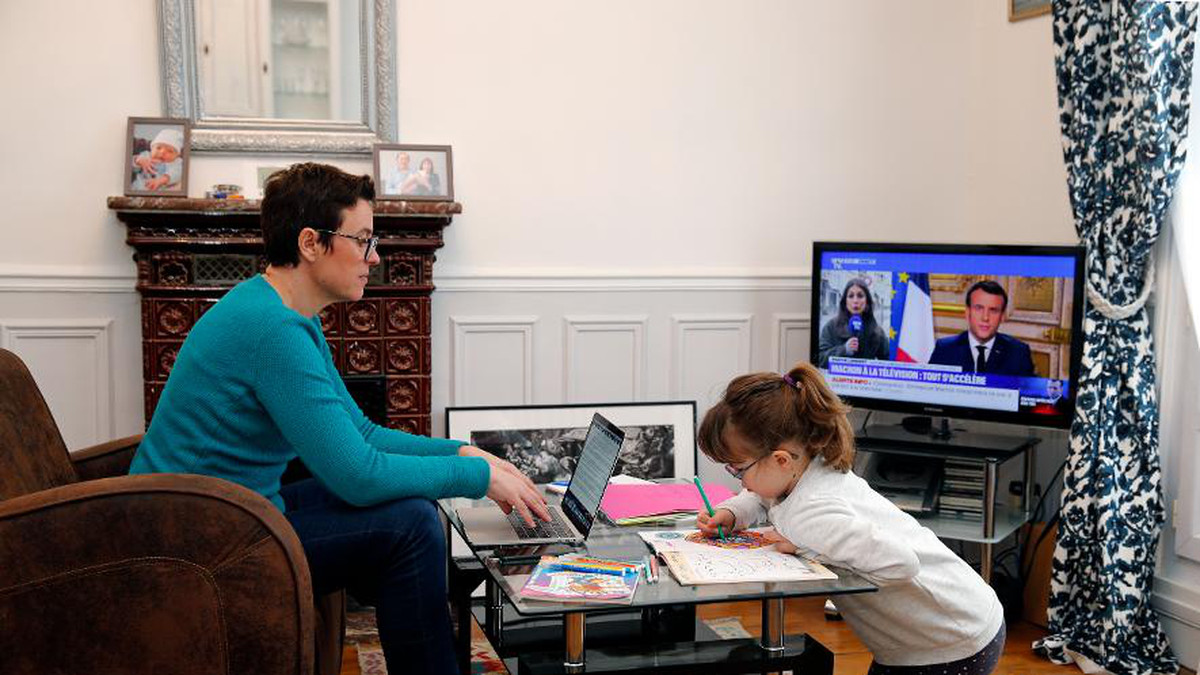“Where did this bowl of ice cream come from?” And other questions that arise when we work from home.
Last week, I was on a video call with a client in the UK. I was in my office in New York. She was at her desk in her home office in a London suburb. I mentioned I would be working from home sporadically starting this week and was worried about, among other things, my habit of raiding the fridge too often (read: constantly). She laughed and said she looked up from her emails the other day and there was a bowl of ice cream next to her laptop. She said, “I thought, ‘where did this come from?’ I didn’t even know I had ice cream in the house!”
Humans are social animals. Most of us expect, need and thrive on connections and interactions. Being told that “social distancing” is the best way to decrease and ultimately defeat COVID-19 comes across as a threat. We’ll each learn more about ourselves and our connections as we adapt to more widespread remote work environments. As large teams transition to full-time work from home, here are answers to some questions you might find yourself asking:
1. How do I manage my eating and other personal habits?
Constant access to food (TV, pets, kids, etc.) isn’t helpful when you need to concentrate on work. We adopt new habits when we are in new situations. Here are physical and metaphysical ways to deal with this challenge.
The metaphysical – Ask yourself, “what are my habits on a typical workday?” If those habits work for you, remind yourself of them and stick to them. Wake up as if you still have to commute: do your morning routine, shower, and get dressed (even if it’s day pajamas). Don’t just roll out of bed and turn on your laptop. Make sure that when you’re ready to start working, you sit in a supportive chair at a dedicated workspace. If your normal behavior at work is to not snack, keep telling yourself, “I’m at work. The same rules apply even though I am sitting in my kitchen.”
The physical – Don’t sit in your kitchen. The physical proximity to food will encourage you to eat. You’re not really hungry; you’re confused. You’re not used to having food so close all day. Sit out of sight of the food and you won’t be as tempted by it. If your kitchen is the only place to sit, put the food out of sight. I just moved a full cookie jar from within arm’s length to the other side of the room. I’m eating fewer cookies and burning some calories walking across the room to get them. The same applies to your other distractions. Put the TV remote out of reach so you’re not tempted to check the new news or turn on your favorite show. Better yet, put it out of sight- maybe across the room in the cookie jar.
2. How do I stay connected to my colleagues?
You’ll need to over-communicate, especially if working from home is new to you, your colleagues or your company. Video-chat options are better than the phone, and the phone is better than email. We’re all adjusting and doing so rapidly. It’s ok to occasionally “stop by” someone’s home desk by checking in just to catch up.
If you manage a team and you’re all new to working remotely, make the effort to check in with each member of your team even if you don’t have anything specific to ask. Remember your habits from the office. If your inclination would be to stop by and check in on someone, don’t let the fact that you’re now working remotely change that behavior. Your team needs to know you are comfortable with this new way of communicating.
We’ve all connected to people via technology. We’re used to it. What many of us aren’t used to is having this be the predominant way we communicate with each other. We don’t know how long this situation will last. Put habits in place as soon as possible to shorten the learning curve, get everyone comfortable with connecting remotely and maintain relationships.
One of the big adjustments we need to make when we all work remotely is that our work habits – dictated and influenced by our organization’s culture and protocols – are suddenly relevant when we are sitting in our living room, den, or home office (but not our kitchen – see above). For instance, if you know the VP of Finance doesn’t like people popping by his office unannounced, he won’t like an unscheduled video call either. If the SVP of Sales is comfortable brainstorming aloud when you stop by her office, she’ll likely be open to the same when you log in for your weekly remote meeting. As more of us work remotely, we will undoubtedly add new dimensions to our firm’s culture, which will eventually be codified through firm protocols. Until those directions are in place, we’ll each have to be more conscious of how we live our firms’ cultures in a remote environment.
While I have been writing this, one of my colleagues called via Microsoft Teams to, I assumed, have a video conversation. However, he had accidentally hit the wrong button and invited our entire leadership team to the call. Although the very brief get-together was unanticipated and technically an interruption, it was the remote equivalent of everyone inadvertently showing up in the break room for a cup of coffee at the same time. It provided a breath, a break, a brief bonding – all necessary to keep colleagues together and on the same path.
3. Why is this such a big deal?
Undoubtedly, many of you have worked remotely for years and are wondering what the big deal is about this mass migration to remote work. You made the mental transition a long time ago, and your habits are now ingrained in your work ethos and your reflexes. Be patient with the rest of us. You may have been the outlier. Now you’re the calm sage, the gracious guide helping the rest of us navigate a new work world.
If we call you too often or without scheduling a meeting first and it bugs you, listen patiently to our prattle and then suggest ways that will work for all of us. If we angle the camera on our laptops so you’re looking up our nostrils, gently suggest we look at the little image in the corner to make sure we see how others are seeing us and suggest we prop up the laptop differently. If you’re suddenly hearing from people a lot more or a lot less than normal, go with it for a while.
As with any change, we’ll all settle into new patterns fairly quickly. We’re all figuring out this brave new world together. We’re all on a learning curve. Personally, I have to learn if I have ice cream. I’m now all out of cookies.
This article was written by Jay Sullivan from Forbes and was legally licensed through the NewsCred publisher network. Please direct all licensing questions to legal@newscred.com.
![]()



